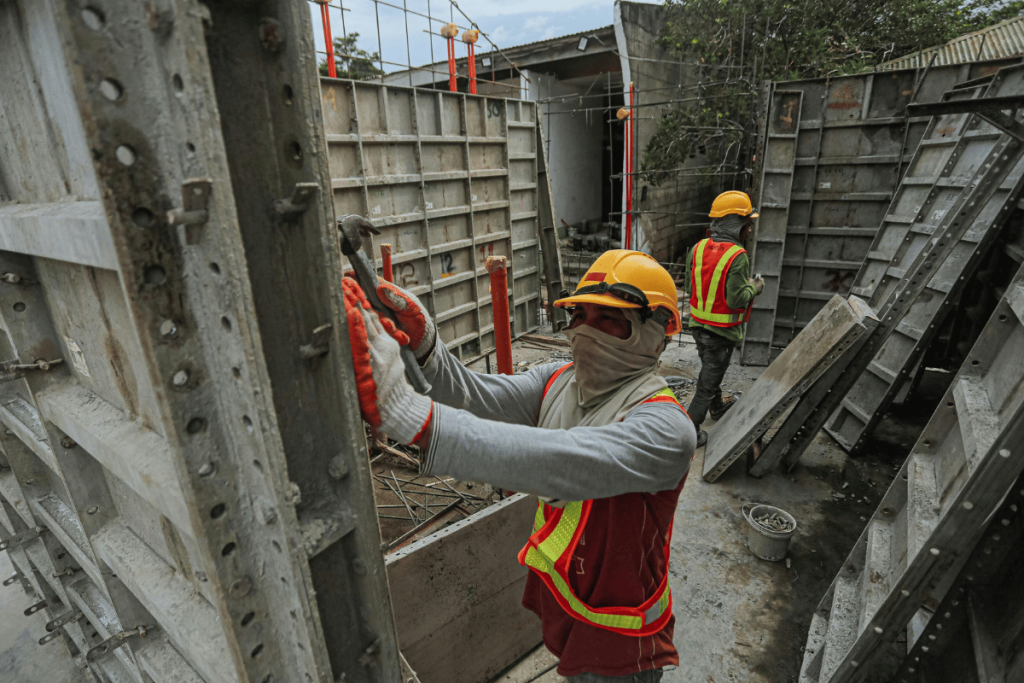Selling your construction company is not as straightforward as you might think. It's complex, nuanced, and frustrating at times, and you can’t get it wrong. It requires the right expertise to navigate buyer identification, business valuation, due diligence, transition, and more!
Below, we outline all the steps you need to follow to sell your construction company for the most money quickly and efficiently. We'll also show you how to value your construction business correctly and help you answer some frequently asked questions.
If you’re short on time, here’s a quick summary. We’ll go into more detail in the following sections.
You don’t have to do this alone. Exitwise helps you hire from a global network of industry-specialized investment bankers, M&A attorneys, and tax accountants to sell your construction business faster and maximize your exit values. Consult with us today!

There are three commonly used valuation methods for construction businesses:
This approach values your company based on its capacity to generate income and potential for future growth. Under income-based valuation, you have:
Let’s look at an example. The evaluation process may be as follows:
DCF formula: DCF = CF1/ (1+discount rate)1 + CF2/ (1+discount rate)2 + … CFn / (1+discount rate)n
Net Present Value (NPV) = ($952,381 + $907,029 + $3,455,350 + $3,290,810 + $4,710,157) - $11 million = $2,306,727
To get a rough estimation of your company’s value, the NPV (intrinsic value) is multiplied by an industry-average market multiple.
Valuation multiples are financial ratios used to estimate a company’s value by looking at how other similar companies are valued in the open market based on their financial metrics.
Construction companies typically sell at 9-11x intrinsic value; let’s choose 9 in this case.
So, in this simple example, your construction company's estimate is roughly $20,720,543.
Also, the NPV, being a positive number, shows the potential to generate a higher return than the initial investment. Therefore, the project may be worthwhile in the long run.
Now, suppose investors use the cap earnings approach to evaluate your business instead. The valuation process might resemble this:
Cap earnings formula: Estimated value = Average Annual Net income/Capitalization Rate
Past 3 years of net income:
Average Annual Net Income = $161,000
Choosing a capitalization rate: The capitalization rate for construction companies typically ranges from 15% to 25% due to the risky nature of the industry (such as economic fluctuations and project cycles).
Let’s assume a capitalization rate of 25% for your construction company.
Estimated Value = $161,000/25% = $644,000
In this case, your construction company might have a ballpark value of approximately $644,000.
Of course, these are just for illustration purposes. A professional evaluation would involve more complex calculations and considerations.

The asset approach is used when the business’s value is not directly tied to its stock market performance but to its tangible and intangible assets. This method benefits construction companies with significant physical assets (equipment or heavy machinery).
In the context of asset-based valuation, the net asset value method is the most commonly used, and the formula is relatively simple:
NAV= Total Assets - Total Liabilities
Assets are what your company owns (machinery, materials, properties, etc.), and liabilities are what is owned (debt, loan, unpaid bills, etc).
Using the asset approach to value a fictional construction company would look something like this:
Company name: Titan Building Group
Assets:
Total Assets: $6,150,000
Liabilities:
Total Liabilities: $1,950,000
NAV = $6,150,000 - $1,950,00 = $4,200,000
Titan Building Group is valued at approximately $4,200,000.

Market-based valuation or comparable analysis compares your company’s financial metrics and market prices (debt-to-equity ratio, gross margin, etc.) with those of similar construction companies to get its value.
Common market-based valuation methods include:
We recommend using our valuation calculator to get an initial idea of your construction company’s value.
When determining the value of your construction company, some key valuation factors you need to consider may impact your business’s overall value. The most common ones include:

Construction companies generally sell at 9-11x EBITDA.
Do keep in mind that the actual value of a construction company goes beyond standard multiples. Many company-specific factors, such as size, owner dependence, team management, subsectors, and other qualitative factors, contribute to a business’s true market value.
There isn’t a universally recognized “rule of thumb” for valuing a construction business due to the various factors that must be considered. However, you can use some general ranges as a starting point for estimating your business’s value.
EBITDA multiples are a good way to get a rough estimation of your construction company’s value, and the formula is straightforward:
Company’s EBITDA times a multiple.
Even though EBITDA is not a recognized metric used by GAAP US (Generally Accepted Accounting Principles) and IFRS (International Financial Reporting Standards), the number you get should give you a good idea of how much your business is worth.
The EBITDA metric is widely used in business valuation. It’s short for Earning Before Interests, Taxes, Depreciation, and Amortization. The formula is as follows:
EBITDA = Depreciation + Operation Profit + Amortization
Or
EBITDA = Net Income + Interest + Taxes + Depreciation + Amortization
The Average REV multiple for construction companies ranges from 0.55x to 0.62x.
Revenue-based valuation multiple is mainly used as a last resort when no other options are available, i.e., the company has a negative profit margin or isn't that profitable.
There are two common variations:
P/S is calculated by dividing the company's market cap by its yearly sales. Here, you're comparing the company's stock price to its revenue.
EV/Revenue, on the other hand, calculates your construction company's total value.

Now that you know company valuation, let’s delve into the actionable steps to sell your construction business and exit the market with maximum profitability.
The first step is obviously to put a price on your construction business, and how much it’s worth will hinge on its financials. Don’t hesitate to combine two or three valuation methods to get a more well-rounded picture of your business’s value.
Also, when pricing your company, you want to ensure the price is neither too high nor too low but just right to pull in the right buyer.
If the price is too low, your company may appear undervalued, which could turn off most buyers. On the other hand, if the price is too high, buyers may perceive the asking price as unjustifiable and discourage offers.
No one knows your construction business better than you, the owner. However, hiring the right experts will ensure a fair valuation of your company and that you get the most value out of the transaction. Generally, you’ll need:
These experts will also help you vet potential buyers, discreetly market your company, and finalize the sales and purchase agreement.
We at Exitwise streamline your construction company selling process by hiring and managing the M&A team to fuel the best exit strategies for your business.
Schedule a call with us today to get industry-specific insights on how you can exit the market profitably.

A professional business appraisal, supported by clear accounting and financial records, showcases your construction business’s earning potential and how much investors can expect to generate from their investment.
Make sure to prepare the following financial statements:
Increasing your business saleability means enhancing your construction business appeal and making it more desirable from a buyer’s perspective. Here are some key ways how to do it:

There are three ways to market your business:
Once you’ve found a potential buyer, the value of your construction business will be the most essential part of negotiating sales terms. If there are any terms you’re unwilling to negotiate, you need to make that clear from the beginning and prepare a detailed list.
Also, be willing to compromise a bit where reasonable and hold where you’ve established your limits. The goal is to show the buyer that you want to meet your needs and theirs.
After you agree on some terms, the buyer will sign your confidentiality agreement, spend a few months performing due diligence, and start working out the deal's details.
Think of this stage as a two-way process.
The buyer will review your documents to ensure the operational, financial, and legal positions are as advertised. And you, the seller, are looking to validate and create a definitive post-transaction plan for your company.
During this process, you just need to be patient and be open to answering any questions the buyer may have.

Once you’ve agreed with the buyer, finalize the legal sales documents and make the transfer. It’s unlikely you’ll receive the agreed price upfront. The payment terms will depend on the specifics of the deal and project.
You need a team of experts (a lawyer, an M&A attorney, etc.) experienced in dealing with similar situations to help you make sure nothing important slips through.
Check out the process we use to help you select the right professionals to be included throughout your construction business selling process.
A lot goes behind the scenes. When they buy your construction company, the buyer acquires your patents, equipment, client lists, and infrastructure. Add to that networks, bringing in new talents and institutional knowledge. All of this takes time to sort through and understand.
Once the deal is closed, the buyer usually requires you to stay for an agreed-upon time to ensure a smooth transition.

Let’s look at some frequently asked questions about selling a construction business.
Several different types of buyers may be interested in your company, some include:
This will also depend on market conditions, company size, and specialization.
You'll need to consult your M&A lawyer regarding the legal aspects of selling your construction company. Some key points to consider:
There are different strategies you can use to keep your construction business confidential. The most effective ones include:
Business brokers can help you:
This can vary depending on the complexity of the deal, but generally you'll need:
Typically, selling a construction business takes anywhere from 6 months to a year (or more). This also depends on your company's size, market conditions, and preparation level.
Consider these 9 steps as the simplified version of selling your construction business. They should make selling your construction company a lot easier and less stressful.
Of course, we’re here to help. At Exitwise, we help businesses interview, hire, and manage their dream M&A teams. Here are some of our success stories of satisfied clients.
Contact us today to schedule your consultation and take the first step toward selling your construction company.
Let Exitwise introduce, hire and manage the best, industry specialized, investment bankers, M&A attorneys, tax accountants and other M&A advisors to help you maximize the sale of your business.

